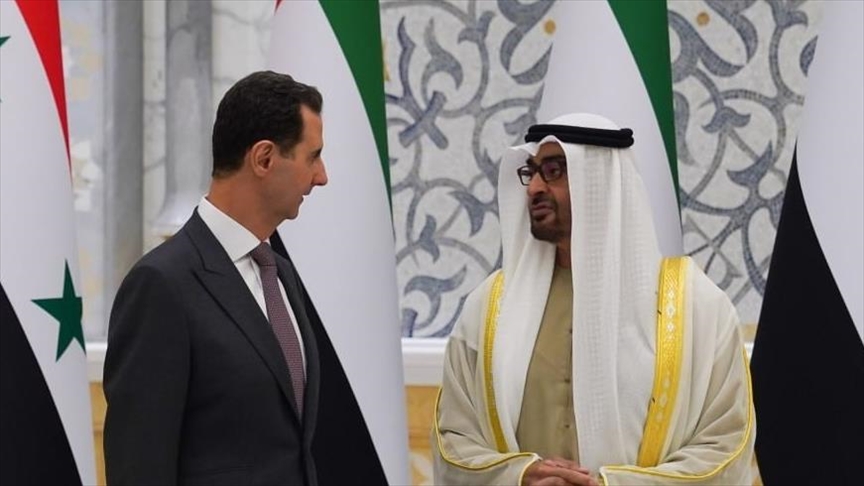This is al-Assad’s second visit to the oil-rich UAE since 2022 visit he made after a decade.
The UAE President Mohammed bin Zayed in a Twitter message commented on bilateral talks with the Syrian leader, saying: “I welcomed President Bashar al-Assad of Syria to the UAE today, and we held constructive talks aimed at developing relations between our two countries. Our discussions also explored ways of enhancing cooperation to accelerate stability and progress in Syria and the region.”
Having restored ties with Syria in 2018, the UAE immediately started its aid delivery after the February 6 earthquake hit northern Syria and southwest Turkey and killed tens of thousands. UAE’s Foreign Minister Sheikh Abdullah bin Zayed was the first senior Arab official to visit Syria post-earthquake.
UAE-Syria relation boost
Emirates was one of the countries that during Syrian crisis backed the Takfiri groups fighting al-Assad and somehow beside Qatar and Saudi Arabia led the anti-Syrian measures to expel Damascus from the Arab League. However resistance of the Syrian people and defeat of the international front of terrorist forces in the devastating war motivated the UAE to review its wrong policies. The situation now is shifting in a way that Abu Dhabi has even increased its political support to Damascus to gain its satisfaction. In an unprecedented stance, the UAE UN envoy Lana Zaki Nusseibeh described the chemical weapons in Syria as “the most politicized” case at the UN in an obvious show of solidarity with Syrian government.
This policy review is also observable economically, and it seems that in the near future, we see the Emirates push to invest in Syria reconstruction.
Before 2011, the UAE was the second largest investor among Arab countries in Syria, especially in real estate and tourism. Reports suggest that the total value of UAE investments in Syria at the beginning of 2011 was more than $20 billion.
Reports show that the UAE was the largest source of direct foreign investment in Syria during the first decade of the current century, with the trade turnover between the two countries in 2009 was nearly $332 million.
Syria regional weight increase
Syria is a long-time actor in the Arab world developments, especially in confrontation of the Israeli regime and support to the Palestinians. Its exit from the crisis makes Syria’s role in regional developments inevitable given its important geopolitical features like having gas-rich coasts, being neighbor to the occupied Palestinian territories, and hosting Russian military bases. These features even persuaded such a regional power as Turkey to review its policies to re-engage with Syria politically. Egypt, a prominent actor in the Arab developments that under short-served Muslim Brotherhood President Mohammad Morsi went belligerent against Syria, chose to interact with Syria under President Abdel Fattah el-Sisi. Actually, now many Arab countries that witnessed the destructive consequences of the West’s interventionist and destabilizing policies in the Arab world are seeking to mend ties with Syria and this more than ever restores Syria’s past regional weight.
A visit amid regional diplomatic improvement
Although al-Assad’s visit to the Persian Gulf is not new and last month Oman hosted him in Muscat, the coincidence of his visits is not irrelevant to some important developments in a regional de-escalation campaign between Iran and such Arab countries as Saudi Arabia and the UAE. This visit was made immediately after a Chinese-brokered Iranian-Saudi détente agreement two weeks ago to end the seven-year diplomatic hiatus between the two regional powers who by the way were backers of opposite sides in Syrian war.
Also, Iran’s Supreme National Security Council’s chief Ali Shamkhani on Thursday talked to the UAE president as well as National Security Advisor Sheikh Tahnoun bin Zayed both of whom were present in al-Assad reception ceremony on Sunday.
Senior diplomatic advisor to the UAE president Anwar Gargash, who is normally recognized as the unofficial mouthpiece of the government in a tweet said: “The UAE’s approach and efforts towards brotherly Syria are part of a deeper vision and a broader approach aimed at strengthening regional stability and overcoming difficult years of confrontation.”
“The UAE’s position is clear regarding the need for Syria to return
to its surroundings by deactivating its Arab role,” Gargash continued.
/129

